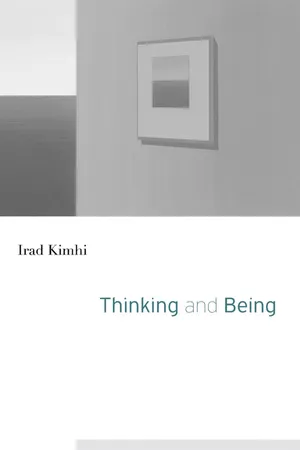Thinking and Being
About this book
Opposing a long-standing orthodoxy of the Western philosophical tradition running from ancient Greek thought until the late nineteenth century, Frege argued that psychological laws of thought—those that explicate how we in fact think—must be distinguished from logical laws of thought—those that formulate and impose rational requirements on thinking. Logic does not describe how we actually think, but only how we should. Yet by thus sundering the logical from the psychological, Frege was unable to explain certain fundamental logical truths, most notably the psychological version of the law of non-contradiction—that one cannot think a thought and its negation simultaneously.
Irad Kimhi's Thinking and Being marks a radical break with Frege's legacy in analytic philosophy, exposing the flaws of his approach and outlining a novel conception of judgment as a two-way capacity. In closing the gap that Frege opened, Kimhi shows that the two principles of non-contradiction—the ontological principle and the psychological principle—are in fact aspects of the very same capacity, differently manifested in thinking and being.
As his argument progresses, Kimhi draws on the insights of historical figures such as Aristotle, Kant, and Wittgenstein to develop highly original accounts of topics that are of central importance to logic and philosophy more generally. Self-consciousness, language, and logic are revealed to be but different sides of the same reality. Ultimately, Kimhi's work elucidates the essential sameness of thinking and being that has exercised Western philosophy since its inception.
Tools to learn more effectively

Saving Books

Keyword Search

Annotating Text

Listen to it instead
Information
CHAPTER ONE
The Life of p
1. Principles of Noncontradiction
1.1.
(OPNC) For the same thing to hold good and not to hold good simultaneously of the same thing and in the same respect is impossible (given any further specification which might be added against the dialectical difficulties). (Gamma 3, 1005b18–21)1
It is appropriate for him who has the best understanding about each genus to be able to state the firmest principles of that actual subject, and hence, when his subject is being qua being, to state the firmest principles of everything: and this man is the philosopher. (Gamma 3, 1005b8–12)
We have to say whether it falls to one, or a different, science to deal with the things that in mathematics are termed axioms, and with substance.2 (Gamma 3, 1005a19–21)
the common opinions from which all people draw proofs—for example, that it is necessary either to affirm or to deny everything, and that it is impossible to be and not to be at the same time, and any other such propositions. (Beta 2, 996b26–30)
It is indeed obvious that the investigation of these [the axioms] too falls to one science, and that the philosopher’s; for they hold good of being qua being and not of a certain genus, separate and distinct from others. (Gamma 3, 1005a21–24)
But that is not surprising, since they alone have considered that they were investigating the whole of nature, i.e., that which is. But since there is someone still further above the student of nature (for nature is one particular genus of what there is), the investigation of these things must fall to him who studies what is universal and primary substance. The study of nature is also a wisdom but not primary. (Gamma 3, 100a32–35)
1.2.
(PPNC) It is impossible for anyone to believe that the same thing is and is not. (Gamma 3, 1005b22–25)
1.3.
2. The Psycho-logical Problem
2.1.
| (1) Psycho-logicism: | ← |
| (2) Logo-psychism: | → |
| (3) Psycho / logical dualism: | ≠ |
| (4) Psycho / logical monism.10 | |
2.2.
Table of contents
- Cover
- Title Page
- Copyright
- Contents
- Introduction
- 1. The Life of p
- 2. The Dominant Sense of Being
- 3. On the Quietism of the Stranger
- Acknowledgments
- Index
Frequently asked questions
- Essential is ideal for learners and professionals who enjoy exploring a wide range of subjects. Access the Essential Library with 800,000+ trusted titles and best-sellers across business, personal growth, and the humanities. Includes unlimited reading time and Standard Read Aloud voice.
- Complete: Perfect for advanced learners and researchers needing full, unrestricted access. Unlock 1.4M+ books across hundreds of subjects, including academic and specialized titles. The Complete Plan also includes advanced features like Premium Read Aloud and Research Assistant.
Please note we cannot support devices running on iOS 13 and Android 7 or earlier. Learn more about using the app
